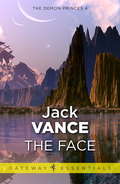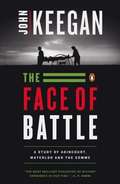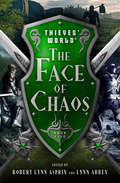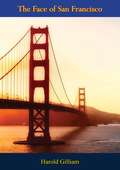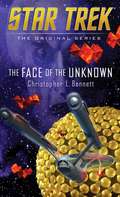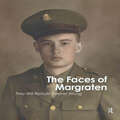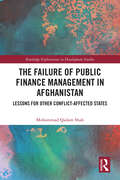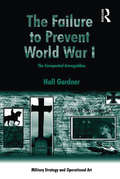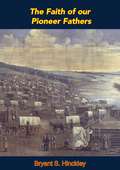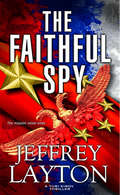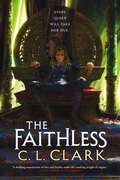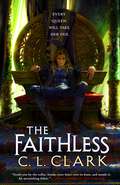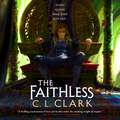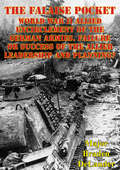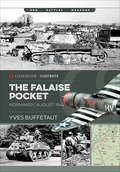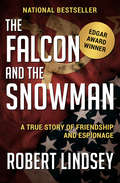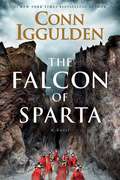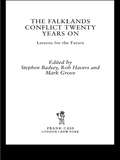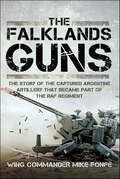- Table View
- List View
The Face (Gateway Essentials #204)
by Jack VanceBook four in the series which relate the story of Kirth Gersen as he exacts his revenge on five notorious criminals, collectively known as the Demon Princes, who carried his village off into slavery during his childhood.
The Face of Battle
by John KeeganMilitary historian John Keegan's groundbreaking analysis of combat and warfareThe Face of Battle is military history from the battlefield: a look at the direct experience of individuals at the "point of maximum danger." Without the myth-making elements of rhetoric and xenophobia, and breaking away from the stylized format of battle descriptions, John Keegan has written what is probably the definitive model for military historians. And in his scrupulous reassessment of three battles representative of three different time periods, he manages to convey what the experience of combat meant for the participants, whether they were facing the arrow cloud at the battle of Agincourt, the musket balls at Waterloo, or the steel rain of the Somme."The best military historian of our generation." -Tom Clancy
The Face of Battle: A Study of Agincourt, Waterloo, and the Somme
by John KeeganMilitary historian John Keegan's groundbreaking analysis of combat and warfare The Face of Battle is military history from the battlefield: a look at the direct experience of individuals at the "point of maximum danger. " Without the myth-making elements of rhetoric and xenophobia, and breaking away from the stylized format of battle descriptions, John Keegan has written what is probably the definitive model for military historians. And in his scrupulous reassessment of three battles representative of three different time periods, he manages to convey what the experience of combat meant for the participants, whether they were facing the arrow cloud at the battle of Agincourt, the musket balls at Waterloo, or the steel rain of the Somme. "The best military historian of our generation. " -Tom Clancy .
The Face of Battle: A Study of Agincourt, Waterloo, and the Somme
by John KeeganMilitary historian John Keegan's groundbreaking analysis of combat and warfareThe Face of Battle is military history from the battlefield: a look at the direct experience of individuals at the "point of maximum danger." Without the myth-making elements of rhetoric and xenophobia, and breaking away from the stylized format of battle descriptions, John Keegan has written what is probably the definitive model for military historians. And in his scrupulous reassessment of three battles representative of three different time periods, he manages to convey what the experience of combat meant for the participants, whether they were facing the arrow cloud at the battle of Agincourt, the musket balls at Waterloo, or the steel rain of the Somme."The best military historian of our generation." -Tom Clancy
The Face of Chaos: Storm Season, The Face Of Chaos, And Wings Of Omen (Thieves' World® #5)
by John Brunner Joe Haldeman Philip José FarmerWar looms over Sanctuary in the fifth Thieves&’ World® anthology compiled by the New York Times–bestselling author of the Phule&’s Company series. The invasion by the Beysibs, an amphibious humanoid race, brings unusual prosperity to the city of Sanctuary. But underneath the glittering façade lies a ticking time bomb, for the nefarious residents of Sanctuary don&’t take kindly to an invasion—well-meaning or otherwise . . . Join Janet Morris, C. J. Cherryh, Robert Lynn Asprin, Lynn Abbey, David Drake, and Diana L. Paxson as their stories unravel the fates of Sanctuary&’s favorite liars, thieves, assassins, and warriors. &“Abbey . . . understands Sanctuary and its characters. She also knows how to write a short story with a strong main character, a riveting plot that contains twists and turns, and a satisfying resolution. Best story in the book . . . Lalo is the most interesting of all of the characters in Thieves&’ World and his stories are always interesting. Paxson . . . spins an interesting and well written yarn that closes the book nicely.&” —brianbookreviews.blogspot.com
The Face of Eve (The Lu Wilmott Sagas)
by Betty BurtonFrom a British novelist acclaimed for her strong heroines and &“good writing&” filled with &“human insight,&” a woman spies for the Allied forces during WWII (The Irish Press). One woman&’s passionate courage during World War II When Eve left her hometown of Portsmouth, she&’d never intended to return. But now she has a confidence and maturity far beyond her years. This makes her a very attractive prospect to David Hatton, charged with selecting highly unusual, independent, and intelligent candidates for the Special Operations Executive. For in the war that lies ahead, brute force won&’t be enough. Eve becomes part of the Second World War in a way that few others could manage. And when the time for role-playing and secrecy is over, who can say which is the real face of Eve? The extraordinary conclusion to Betty Burton&’s captivating Lu Wilmott novels. &“It is encouraging when someone like Betty Burton manages against the odds to become a roaring success.&” —The Guardian
The Face of San Francisco
by Harold GilliamThis is a love poem in prose—a shining ode to the most beautiful, sophisticated, decadent, provincial, elusive, and utterly paradoxical city in America. It is also a romantic portrait—a masterwork that captures the incredible loveliness of the city’s face even as it reveals a dark secret or two of its inconstant heart.This is THE FACE OF SAN FRANCISCO, from the Bay Bridge to the back alleys, from the dazzling mansions of Pacific Heights to the down-at-the-heels pads of North Beach—captured in words by the author of San Francisco Bay, and columnist for the San Francisco Examiner, Harold Gilliam, and caught in nearly 200 revealing faces by the camera of Phil Palmer (1911-1992).
The Face of the Unknown (Star Trek: The Original Series)
by Christopher L. BennettContinuing the milestone 50th anniversary celebration of Star Trek—a brand-new novel of The Original Series featuring James T. Kirk, Spock, and the crew of the USS Enterprise!Investigating a series of violent raids by a mysterious predatory species, Captain James T. Kirk discovers that these events share a startling connection with the First Federation, a friendly but secretive civilization contacted early in the USS Enterprise’s five-year mission. Traveling to the First Federation in search of answers, the Enterprise suddenly comes under attack from these strange marauders. Seeking refuge, the starship finds its way to the true home of the First Federation, an astonishing collection of worlds hidden from the galaxy beyond. The inhabitants of this isolated realm are wary of outsiders, and some accuse Kirk and his crew for bringing the wrath of their ancient enemy down upon them. When an attempt to stave off disaster goes tragically wrong, Kirk is held fully accountable, and Commander Spock learns there are even deeper forces that threaten this civilization. If Kirk and Spock cannot convince the First Federation's leaders to overcome their fears, the resulting catastrophe could doom them all!
The Facemaker: A Visionary Surgeon's Battle to Mend the Disfigured Soldiers of World War I
by Lindsey FitzharrisA New York Times Bestseller"Enthralling. Harrowing. Heartbreaking. And utterly redemptive. Lindsey Fitzharris hit this one out of the park." —Erik Larson, author of The Splendid and the VileLindsey Fitzharris, the award-winning author of The Butchering Art, presents the compelling, true story of a visionary surgeon who rebuilt the faces of the First World War’s injured heroes, and in the process ushered in the modern era of plastic surgery.From the moment the first machine gun rang out over the Western Front, one thing was clear: humankind’s military technology had wildly surpassed its medical capabilities. Bodies were battered, gouged, hacked, and gassed. The First World War claimed millions of lives and left millions more wounded and disfigured. In the midst of this brutality, however, there were also those who strove to alleviate suffering. The Facemaker tells the extraordinary story of such an individual: the pioneering plastic surgeon Harold Gillies, who dedicated himself to reconstructing the burned and broken faces of the injured soldiers under his care.Gillies, a Cambridge-educated New Zealander, became interested in the nascent field of plastic surgery after encountering the human wreckage on the front. Returning to Britain, he established one of the world’s first hospitals dedicated entirely to facial reconstruction. There, Gillies assembled a unique group of practitioners whose task was to rebuild what had been torn apart, to re-create what had been destroyed. At a time when losing a limb made a soldier a hero, but losing a face made him a monster to a society largely intolerant of disfigurement, Gillies restored not just the faces of the wounded but also their spirits.The Facemaker places Gillies’s ingenious surgical innovations alongside the dramatic stories of soldiers whose lives were wrecked and repaired. The result is a vivid account of how medicine can be an art, and of what courage and imagination can accomplish in the presence of relentless horror.
The Faces of Margraten: They Will Remain Forever Young
by Stichting Fields of HonorIn the rolling hills of the Limburg Province, near the village of Margraten, they slowly loom up, row after row: thousands of white marble crosses and Stars of David. They mark the final resting place of American soldiers who died fighting to liberate the Netherlands during World War II. While the headstones provide the names and ages of those lost, they cannot tell us who these soldiers were, what their lives were like, or who they left behind. Nor can the peace and quiet at the only American military cemetery in the Netherlands reflect the harrowing experience and violent final moments of the men and women who forever rest here. Through hundreds of personal photographs and more than 250 stories, The Faces of Margraten gives these soldiers faces and voices again, telling not only the history of World War II and the ending of the German occupation of the Netherlands, but also revealing how and why the Dutch people have never forgotten their liberators. Concluding with a list of all the soldiers' names, this commemorative book stands as a testament to the service and sacrifice of the more than 10,000 Americans buried or memorialized as missing in Margraten.
The Factory Girl
by Maggie FordFrom rags to riches...With the Armistice only a few months passed, times are hard for eighteen-year-old Geraldine Glover. A machinist at Rubins clothing factory in the East End, she dreams of a more glamorous life. When she meets Tony Hanford, the young and handsome proprietor of a small jeweller's shop in Bond Street, Geraldine is propelled into a new world – but it comes at a heavy price...
The Failure of Public Finance Management in Afghanistan: Lessons for Other Conflict-Affected States (Routledge Explorations in Development Studies)
by Mohammad Qadam ShahIn rebuilding conflict-affected states, a major portion of foreign aid focuses on reforming public finance management systems and supporting annual budgets. However, how budgets are allocated and how reforms take shape in practice remain critical questions.This book analyzes the politics of reform and budget allocation in the most expensive liberal state-building effort in history: Afghanistan. Through a detailed political economy analysis, it explores the origin, continuity, and evolution of Afghanistan’s centralized public finance management system. Such centralization, readopted in the 2004 Constitution, constrained local participation, perpetuated inequities, and undermined predictability and transparency. Key reforms including the “Provincial Development Planning Guideline” and “Provincial Budgeting Policy” aimed to address these shortcomings but failed due to political resistance, elite capture, and structural inefficiencies. The analysis reveals informal dynamics behind the allocation of discretionary development budget consisting of the Afghan central government’s political considerations (political relationship, political importance, and strength and weakness of local administrations) and lobbying strategies of local actors. This dynamic enabled the central government to continue to use public funds for purchasing political legitimacy to remain in power.Afghanistan’s case highlights the limits of externally driven state-building that prioritizes centralization over local dynamics. The book offers key lessons on inclusive governance, structural barriers, and sustainable public finance reforms in conflict-affected states. It appeals to donors, development experts, and researchers in public finance, foreign aid, security, and development studies.
The Failure to Prevent World War I: The Unexpected Armageddon (Military Strategy and Operational Art)
by Hall GardnerWorld War I represents one of the most studied, yet least understood, systemic conflicts in modern history. At the time, it was a major power war that was largely unexpected. This book refines and expands points made in the author’s earlier work on the failure to prevent World War I. It provides an alternative viewpoint to the thesis of Christopher Clark, Fritz Fischer, Paul Kennedy, among others, as to the war's long-term origins. By starting its analysis with the causes and consequences of the 1870-71 Franco-Prussian War and the German annexation of Alsace-Lorraine, the study systematically explores the key geostrategic, political-economic and socio-cultural-ideological disputes between France, Germany, Austria-Hungary, Italy, Russia, Japan, the United States and Great Britain, the nature of their foreign policy goals, alliance formations, arms rivalries, as well as the dynamics of the diplomatic process, so as to better explain the deeper roots of the 'Great War'. The book concludes with a discussion of the war's relevance and the diplomatic failure to forge a possible Anglo-German-French alliance, while pointing out how it took a second world war to realize Victor Hugo’s nineteenth-century vision of a United States of Europe-a vision now being challenged by financial crisis and Russia's annexation of Crimea.
The Faith of our Pioneer Fathers
by Bryant S. HinckleyMinstrels, troubadours—the story tellers of old—stirred the hearts of men and moved them to action as they retold the sagas of valor and devotion of ancient heroes.Gathered here are stirring stories, sagas of faith and devotion, associated with the careers of twenty-two heroic figures of our day.From careers like these we gain encouragement and strength which drive away fear and doubt. Frustrations and defeats become the challenges which beckon us to try again in the spirit which is sustained and made ready to enjoy ultimate victory.From these we learn fortitude in the face of adversity and gratitude to Divine Providence for the generous rewards of faithfulness.Though several of the stories included in “Faith of Our Pioneer Fathers” are familiar in other settings, some are available for the first time.
The Faith of the American Soldier
by Stephen MansfieldWhat goes through the mind of an American warrior spiritually and religiously when facing the enemy? Touching on a subject that few books have treated, The Faith of the American Soldier examines the religious and spiritual issues in America's wars, and then considers what is lost to our military through a secular approach to battle. Stephen Mansfield, author of The Faith of George W. Bush, a New York Times bestseller, records the refelctionsand testimonies of men and women who have fought on the front lines from Lexington to Iraq. "This book is the product of a search for the meaning of the American warrior code and the faith that gave it birth," Mansfield writes. " A nation's warrior code is an extension of its soul, the embodiment of its highest ideals. "
The Faithful Spy (A Yuri Kirov Thriller #3)
by Jeffrey LaytonA spy without a country . . . Yuri Kirov is a wanted man. A former intelligence officer for the Russian Navy, he is living incognito in the United States. But the Russians are not through with him. He is recalled to duty and ordered to complete one last mission: infiltrate a Chinese naval base and install spy hardware on their newest nuclear submarine. As a Navy veteran and expert in underwater technology, Yuri is the perfect man for the job. But with his family in danger in the U.S., he is also the perfect pawn. By the time Yuri discovers the true purpose of his mission, it is too late. A new Cold War is heating up. And it’s about to go nuclear . . . Praise for the The Good Spy“An explosive, high-stakes thriller that keeps you guessing.” —Leo J. Maloney “The excitement never stops . . . high adventure at its very best.”—Gayle Lynds “A page-turner with as much heart as brains.” —Dana Haynes “A fast-paced adventure that will take readers on a thrilling journey.” —Diana Chambers “Breathless entertainment.” —Tim Tigner
The Faithless (Magic of the Lost #2)
by C. L. ClarkIn the second installment of C.L. Clark's Magic of the Lost trilogy, soldier Touraine and princess Luca must return to Balladaire to reclaim Luca's throne and to face the consequences of dismantling an empire. The rebels have won, and the empire is withdrawing from Qazal. But undoing the tangled web that binds the two nations will not be easy, and Touraine and Luca will face their greatest challenge yet.Luca needs to oust her uncle from the Balladairan throne once and for all and take her rightful place as Queen. But he won't let go of power so easily. When he calls for a "Trial of Competence" and Luca's allies start disappearing from her side, she will need to find a way to prove her might. And she knows someone who can help...Touraine has found a home in the newly free country of Qazal. But she soon realizes that leading a country and leading a revolution are two very different tasks. And, even more importantly, if Luca's uncle doesn't ratify the treaty, the Qazali could end up right back where they started. Together, the two women will have to come overcome their enemies, their history, and their heartbreak in order to find a way to secure Luca's power and Touraine's freedom.
The Faithless: Magic of the Lost, Book 2 (Magic of the Lost #2)
by C. L. ClarkThe rebels have won, and the empire is withdrawing from Qazal. But undoing the tangled web that binds the two nations will not be easy, and Touraine and Luca will face their greatest challenge yet.Luca needs to oust her uncle from the Balladairan throne once and for all and take her rightful place as Queen. But he won't let go of power so easily. When he calls for a 'Trial of Competence' and Luca's allies start disappearing from her side, she will need to find a way to prove her might. And she knows someone who can help. . .Touraine has found a home in the newly free country of Qazal. But she soon realizes that leading a country and leading a revolution are two very different tasks. And, even more importantly, if Luca's uncle doesn't ratify the treaty, the Qazali could end up right back where they started. Together, the two women will have to overcome their enemies, their history, and their heartbreak in order to find a way to secure Luca's power and Touraine's freedom.
The Faithless: Magic of the Lost, Book 2 (Magic of the Lost #2)
by C. L. ClarkThe rebels have won, and the empire is withdrawing from Qazal. But undoing the tangled web that binds the two nations will not be easy, and Touraine and Luca will face their greatest challenge yet.Luca needs to oust her uncle from the Balladairan throne once and for all and take her rightful place as Queen. But he won't let go of power so easily. When he calls for a 'Trial of Competence' and Luca's allies start disappearing from her side, she will need to find a way to prove her might. And she knows someone who can help. . .Touraine has found a home in the newly free country of Qazal. But she soon realizes that leading a country and leading a revolution are two very different tasks. And, even more importantly, if Luca's uncle doesn't ratify the treaty, the Qazali could end up right back where they started. Together, the two women will have to overcome their enemies, their history, and their heartbreak in order to find a way to secure Luca's power and Touraine's freedom.
The Falaise Pocket. World War II Allied Encirclement Of The German Armies.: Failure Or Success Of The Allied Leadership And Planning?
by Major Braden DelauderBy Aug. 1944, the Allies had broken out of the Normandy beachhead and were rapidly exploiting a breakthrough in the German lines. In early Aug., Hitler ordered a heavy single pronged attack to the west toward Avranches to cut off the US forces to the south. With the 'Ultra' intelligence, Bradley recognized this as an opportunity to encircle the German Army in France. By turning Patton's Third Army, in the south, north towards Argentan, Bradley formed the lower jaw of a pincer movement while Montgomery ordered Crerar's First Canadian Army south to push towards Falaise to form the upper jaw. Connecting the Allied armies between Falaise and Argentan would completely surround the German army. The encirclement of the German forces would be known as the Falaise pocket.To the north, Montgomery's forces struggled to push south against the German defensive line. Patton's Third Army, in concert with the XIX Tactical Air Command, was making extremely rapid progress. Late on the 12th of Aug., Bradley stopped Patton's forces from moving north of Argentan. The decision to stop Third Army's movement north allowed many German personnel to escape from the Falaise pocket.I will analyze the leadership decisions, command relationships, and what I think to be a lack of communication between the Allied leaders. Why did Montgomery, who was commander of the Allied ground forces in France, not close the pincer from the south? Why did Bradley stop forces at Argentan? Why didn't Eisenhower get involved?The Allied leadership failed to capitalize or exploit the mistake made by Hitler driving the German Army westward. By not closing the pocket's gap at Falaise, the Allied forces lost an opportunity to destroy a large percentage of the enemy in France. The major factor for this failure was conflicting commander personalities.
The Falaise Pocket: Normandy, August 1944 (Casemate Illustrated #Cis0010)
by Yves BuffetautThe battle of the Falaise Pocket, in August 1944, was the turning point in the Normandy campaign. By early August the German Army was in turmoil: while it was managing to hold back the Allies, the defense involved resources that could not be replaced, and the Allies ruled the skies above. In late July, American troops broke through the American lines and pushed south and east, while British and Canadian troops pushed south. Although unable to counter these offensives, Hitler refused to permit the commander Army Group B, Field Marshal von Kluge, to withdraw. Instead he was ordered to launch a counteroffensive at Mortain, the result being that the Germans ended up further into the Allied envelopment. On 8 August Montgomery ordered that the Allied armies converge on the Falaise area—by 21 August the Allies had linked up and sealed the pocket, trapping around 50,000 Germans inside. While many soldiers did eventually escape the encirclement, the losses were catastrophic and by the end of the month Army Group B had retreated across the Seine, ending the battle of Normandy. This illustrated account examines the battle from the failed offensive at Mortain, looking at both German and Allied perspectives, using maps, diagrams and profiles to complete the story.
The Falcon and the Snowman: A True Story of Friendship and Espionage
by Robert LindseyThis fascinating account of how two young Americans turned traitor during the Cold War is an &“absolutely smashing real-life spy story&” (The New York Times Book Review). At the height of the Cold War, some of the nation&’s most precious secrets passed through a CIA contractor in Southern California. Only a handful of employees were cleared to handle the intelligence that came through the Black Vault. One of them was Christopher John Boyce, a hard-partying genius with a sky-high IQ, a passion for falconry, and little love for his country. Security at the Vault was so lax, Boyce couldn&’t help but be tempted. And when he gave in, the fate of the free world would hang in the balance. With the help of his best friend, Andrew Daulton Lee, a drug dealer with connections south of the border, Boyce began stealing classified documents and selling them to the Soviet embassy in Mexico City. It was an audacious act of treason, committed by two spoiled young men who were nearly always drunk, stoned, or both—and were about to find themselves caught in the middle of a fight between the CIA and the KGB. This Edgar Award–winning book was the inspiration for the critically acclaimed film starring Timothy Hutton and Sean Penn—a true story as thrilling as any dreamed up by Ian Fleming or John le Carré. Before Edward Snowden, there were Boyce and Lee, two of the most unlikely spies in the history of the Cold War.
The Falcon of Sparta: A Novel
by Conn IgguldenBased on one of history’s most epic stories of adventure, The Falcon of Sparta masterfully depicts the ferocity, heroism, and savage bloodshed of the ancient world. Conn Iggulden, the New York Times bestselling author of the Emperor, Conqueror, and Wars of the Roses series, returns to the ancient world with a ferociously violent epic. 401 BC. In the ancient world, one army was feared above all others. The Persian king Artaxerxes rules an empire stretching from the Aegean to northern India. As many as fifty million people are his subjects. His rule is absolute. Though the sons of Sparta are eager to play the game of thrones . . . Yet battles can be won—or lost—with a single blow. Princes fall. And when the dust of civil war settles, the Spar- tans are left stranded in the heart of an enemy’s empire, without support, without food, and without water. Far from home, surrounded by foes, it falls to the young soldier Xenophon to lead the survivors against Artaxerxes’s legendary Persian warriors.
The Falklands Conflict Twenty Years On: Lessons for the Future
by Stephen Badsey Rob Havers Mark GroveA fascinating new insight into the Falklands Conflict, covering every aspect of its origins and the political and diplomatic response to the Argentinean action as well as illuminating accounts of the military action to retake the islands, at every level of command. In June 2002, exactly twenty years after the cessation of hostilities between Britain and Argentina, many of the key participants came together at a major international conference. This conference, held at the Royal Military Academy, Sandhurst and organized jointly by RMA Sandhurst and her sister institution Britannia Royal Naval College, Dartmouth, aimed to re-examine the events of spring 1982 from the perspective that only twenty intervening years can bring. The Conference mixed those who had participated in the events of spring and early summer 1982, diplomats, politicians, civil servants, soldiers, sailors and airmen, with historians, political scientists and journalists. These accounts and interpretations of the conflict shed new light on one of the most interesting and controversial episodes in recent British history.
The Falklands Guns: The Story of the Captured Argentine Artillery that Became Part of the RAF Regiment
by Mike FonféThe Oerlikon twin 35mm anti-aircraft gun was the one weapon in the Argentine armory which had a major impact on the British air campaign during the Falklands Conflict in 1982. Indeed, General Mario Benjamin Menéndez, transient Argentine Governor of Las Islas Malvinas, proudly boasted that: ‘The anti-aircraft gunners were the only Argentine forces on the Malvinas not to be beaten directly by the British and can take pride in being the first and the last to fire on the enemy.’ Following the Argentine surrender, what were then the latest of these Swiss-built all-weather Skyguard radar-directed guns, which had been purchased by the Argentine Government for £30 million, were recovered from the Falklands’ battlefields by a young squadron leader who recognized their value to the RAF for airfield defense. That officer, Michael Fonfé, was then handed the task of creating two Royal Auxiliary Air Force Regiment squadrons from scratch to operate the guns. This story of the Falkland Guns begins with an account of the experiences of three Argentine anti-aircraft artillery units during the Falklands War, drawing in part on many original Argentine documents the enemy gunners left behind, being unable to take them with them as prisoners of war. Comparisons are drawn with the inferior British equivalents by the gunners who had to man them and the obvious benefits the capture of the new Oerlikons would be to the RAF. After successfully incorporating Nos. 2729 and 2890 Squadrons into the RAF Regiment’s structure – which included women in combat roles for the first time – Michael Fonfé was promoted to Wing Commander. He was then handed responsibility for all RAF ground-based air defense weapons during the long years of the Cold War.
